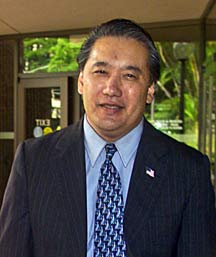U.S. judge upholds
Mirikitani sentence
The ex-councilman declines
to address the court regarding
his kickback case
Convicted former City Councilman Andrew Mirikitani will have to serve the remainder of a 51-month federal prison sentence he received for giving two staff aides bonuses in exchange for kickbacks.
![]()

![]()
Andrew Mirikitani: The judge says his 51-month term is deserved
Mirikitani, who had served about 33 1/2-months of his sentence before Gillmor allowed him released on bail on Nov. 3, 2004, pending the U.S. Supreme Court's decision on federal sentencing guidelines, has about 18 months left to serve, without taking into account credit for good behavior.
A federal jury convicted Mirikitani in July 2001 of wire fraud, theft, bribery, extortion and witness tampering for giving $26,533 in bonuses from his Council salaries account to two aides in exchange for $6,884 in kickbacks.
Mirikitani's attorney, Georgia McMillen, said a U.S. Supreme Court ruling in January prohibits judges from increasing sentences using facts not presented to a jury and made federal sentencing guidelines no longer mandatory. McMillen said Mirikitani was not found to be an organizer of criminal activity and did not perjure himself.
But Gillmor ruled yesterday, as she did in December 2001, that the jury had found and the testimony at trial showed Mirikitani was an "organizer, leader, manager or supervisor in a criminal activity" when he solicited the kickbacks and then perjured himself at trial when he denied receiving the money -- contrary to the testimony of his two aides.
Those factors formed the basis for a hike in the sentencing guidelines to a level of 51 to 63 months from a base level of 33 to 41 months.
Gillmor, who presided over the trial, said the increase in sentence based on those factors was warranted and that the seriousness of Mirikitani's conduct can't be overstated.
"This was not a minor infraction," Gillmor said. "This was a person who had the public's trust, was entrusted by his constituents and was supposed to be an example to the rest of the state by performing his public duties."
Mirikitani and McMillen refused comment after the sentencing.
But in court, McMillen argued that that the 33 months her client has already served is "sufficient, but no more than necessary" based on the facts of the case and his lack of criminal record. She said Mirikitani has led an "exemplary life" in public service and that his conviction represented a "tragic anomaly."
The offenses occurred after a difficult period in Mirikitani's life in 1998 when he lost his father and his longtime partner and was estranged from his only surviving sibling, she said.
McMillen suggested that the court has the flexibility to craft a sentence that would allow Mirikitani to serve the remainder of his sentence in home confinement or in a halfway home.
Assistant U.S. Attorney Michael Purpura said no circumstances have changed to warrant a reduction and the government still feels the range of 51 to 63 months considered by the court at Mirikitani's sentencing was warranted given the egregiousness of his conduct.
"The defendant still today indicates no remorse for his actions or that he has been humbled or learned from his experience at all," Purpura said.
When given a chance to address the court, Mirikitani declined.
Mirikitani was ordered to surrender to a facility designated by the U.S. Bureau of Prisons on June 28.
When he gets out, Mirikitani must also serve three years of supervised release. He has already paid $6,684 in restitution to the city.
Mirikitani, who has settled in Texas with his wife, the former Sharron Bynum, who was also convicted, hopes he can serve out his term at a federal facility in Texas. Since his release in November, Mirikitani has held a temporary job before starting a home-based business with his wife selling household collectibles on the Internet, as well as caring for her, McMillen said.
Bynum, who was convicted of theft and extortion, is free after serving a year and nine months at a federal facility in Texas.
[News] [Business] [Features] [Sports] [Editorial] [Do It Electric!]
[Classified Ads] [Search] [Subscribe] [Info] [Letter to Editor]
[Feedback]
